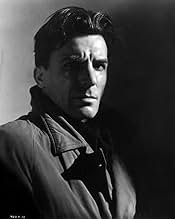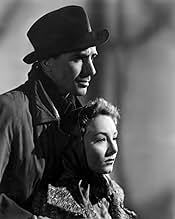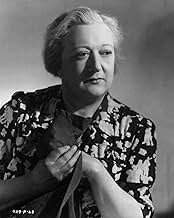Füge eine Handlung in deiner Sprache hinzuA train disaster is told as four short stories to give character studies of the people involved, how it will affect them, and how they deal with it.A train disaster is told as four short stories to give character studies of the people involved, how it will affect them, and how they deal with it.A train disaster is told as four short stories to give character studies of the people involved, how it will affect them, and how they deal with it.
Patric Doonan
- Ron Stacey (segment "The Engine Driver")
- (as Patrick Doonan/Patric Doonan)
Empfohlene Bewertungen
The film starts with a train crash and then spends its bulk describing 4 separate situations that leads to various characters being on board the doomed train. We then return to the crash and see its aftermath.
Sounds better than it is. The film starts impressively with the force and speed of the train filmed very dramatically. This is far and away the best part of the film and provides a very powerful opening. As we meet the characters, the film gets boring and sadly, that awful unfunny British humour rears its ugly head in a couple of scenes. Trying to endear the audience to old guys by getting them to imitate a chicken or a goldfish just isn't funny to me.
Aside from the naff comedy, the cast aren't very good. This is because either the characters are weak, such as Joan Dowling (Ella), to the point where we don't care about her fate, or else they are just difficult to like. A case in point is pretty much everyone else apart from Valerie Hobson (Stella).
Pianist Irina Baronova (Irina) and composer John Clements (Raymond) are painfully embarrassing and it's all a bit of an anti-climax when so many of this dull ensemble actually survive what looks like a crash that should have resulted in many more fatalities. Oh well, better luck next time! The film scores for the excellent beginning and a confrontational scene between husband and wife Peter Finch (Philip) and Mary Morris (Louise). If the film had concentrated on developing this story in a dramatic fashion, I would be talking about a much better film. But even this little vignette is ruined by absurdity as demonstrated by what Peter Finch decides to pack in his luggage. In his LUGGAGE! To take with him! Dumb film.
Sounds better than it is. The film starts impressively with the force and speed of the train filmed very dramatically. This is far and away the best part of the film and provides a very powerful opening. As we meet the characters, the film gets boring and sadly, that awful unfunny British humour rears its ugly head in a couple of scenes. Trying to endear the audience to old guys by getting them to imitate a chicken or a goldfish just isn't funny to me.
Aside from the naff comedy, the cast aren't very good. This is because either the characters are weak, such as Joan Dowling (Ella), to the point where we don't care about her fate, or else they are just difficult to like. A case in point is pretty much everyone else apart from Valerie Hobson (Stella).
Pianist Irina Baronova (Irina) and composer John Clements (Raymond) are painfully embarrassing and it's all a bit of an anti-climax when so many of this dull ensemble actually survive what looks like a crash that should have resulted in many more fatalities. Oh well, better luck next time! The film scores for the excellent beginning and a confrontational scene between husband and wife Peter Finch (Philip) and Mary Morris (Louise). If the film had concentrated on developing this story in a dramatic fashion, I would be talking about a much better film. But even this little vignette is ruined by absurdity as demonstrated by what Peter Finch decides to pack in his luggage. In his LUGGAGE! To take with him! Dumb film.
This is a not very widely known portmanteau film from 1949, in which four disparate stories are told, each culminating in the protagonists boarding a train to Liverpool, their stories becoming ever more enmeshed, only this train is headed for disaster.
I largely agree with Robert Temple's review (although there are spoilers and it is John Clements who plays the composer, not Gregson).
In contrast to many of the other reviews I found something rather good in all four stories, be it drama, witty dialogue, or humour. I thought it was all rather well done actually. For me, the standout performance was probably that of Peter Finch, who looked gaunt and utterly riven throughout.
In addition to the intriguing structure of the film -which has surely acted as an example to later directors- this film has interest today because it shows many street scenes in London and various scenes shot on the railways; who would have thought the age of steam would be over about fifteen years after this?
Anyway whilst some of the facets of this film will be lost on some folk, overall I thought it a pretty good effort, deserving to be better known and more widely appreciated than it is. Eight out of ten from me.
I largely agree with Robert Temple's review (although there are spoilers and it is John Clements who plays the composer, not Gregson).
In contrast to many of the other reviews I found something rather good in all four stories, be it drama, witty dialogue, or humour. I thought it was all rather well done actually. For me, the standout performance was probably that of Peter Finch, who looked gaunt and utterly riven throughout.
In addition to the intriguing structure of the film -which has surely acted as an example to later directors- this film has interest today because it shows many street scenes in London and various scenes shot on the railways; who would have thought the age of steam would be over about fifteen years after this?
Anyway whilst some of the facets of this film will be lost on some folk, overall I thought it a pretty good effort, deserving to be better known and more widely appreciated than it is. Eight out of ten from me.
Ealing Studios portmanteau drama that starts with a train crash, then follows four separate stories, showing the backstories of some of the passengers, the events that led to them being on the train, and the aftermath of the crash. Some big names of the day (Jack Warner, Susan Shaw, Miles Malleson, John Gregson, Valerie Hobson, Michael Hordern, and 'introducing' a very young Peter Finch). Several directors and writers involved, including Basil Dearden (who had a hand in both). Made over 70 years ago, but it stands up well. 7/10.
This curiously little known film commands your attention from the very beginning - with what must be one of the best opening sequences ever committed to film - a startling ultra-serious train wreck looming forward - but we don't see the outcome till the finish of the story. The story, or actually stories, take the form of introducing us to four of the doomed train's passengers from 3 days before the incident. Four British directors each take a turn at 'telling' each passengers tale - up to the aftermath. For some, this technique might give the movie an episodic feel, as each presents in their own style but most won't even be aware of this. Generally, it's an interesting movie even if certain elements might now look somewhat dated but this of course will be personal to each viewer.
Two major award-winning Cinematographers Paul Beeson, and Gordon Dines, share the job of capturing the events as they unfold - all on nice b/w film stock. The film has been given a quite lavish re-mastering and the Ealing Studios DVD offers clean images and good sound. As might be expected from Ealing, there are scatterings of humor throughout the dramatic journey. Train enthusiasts will be enthralled at seeing the range of engines and rolling stock of the day being paraded - including LMS Royal Scott Class No. 46126. For any who enjoy British 40-50s movies, this could well suit you and Aussie Peter Finch appears in a major early role.
Two major award-winning Cinematographers Paul Beeson, and Gordon Dines, share the job of capturing the events as they unfold - all on nice b/w film stock. The film has been given a quite lavish re-mastering and the Ealing Studios DVD offers clean images and good sound. As might be expected from Ealing, there are scatterings of humor throughout the dramatic journey. Train enthusiasts will be enthralled at seeing the range of engines and rolling stock of the day being paraded - including LMS Royal Scott Class No. 46126. For any who enjoy British 40-50s movies, this could well suit you and Aussie Peter Finch appears in a major early role.
This film is one of the finest achievements of British cinema in the immediate post-War period, having been shot in March of 1948 (as a calendar in one shot shows) and released in 1949. The film is remarkable for the 'introducing' of Peter Finch, who is absolutely brilliant as a tormented young man who has been driven mad by six years in the Army and his faithless and tormenting wife, played with skin-crawling provocation by the relentless Mary Morris, one of the finer actresses of that period. Their story is a distinct film noir strand in the tapestry woven of separate stories of people over the three days prior to their boarding an ill-fated train from London's Euston Station to Liverpool, on the ominously-named Platform 13. Although this is a film of multiple story-lines all converging on a single journey, they are all compelling, and there is no sense of lack of unity. In other words, the bold project of making this film paid off and is a complete creative success. The film is compulsive viewing for anyone familiar with or interested in how certain places and things looked in the London of 1948, as the location shooting is very extensive indeed, and it is in that sense like a time-capsule travelogue. I sat watching this recently released DVD with my finger on the pause button for the entire time. I must have stopped it and rewound thirty or forty times, all agog at how clearly it showed the immediate post-War Kings Cross area (now being totally redeveloped), the old Euston Station, the Strand, Trafalgar Square, and other locations. Anyone interested in steam trains will find the many detailed shots of them irresistible, because the train driver (solidly played by Jack Warner) is a main character, and we see every aspect of servicing, turning round, and operating the trains, with a thoroughness and multiplicity of close-ups of the machinery approaching that of a documentary, and reminding one of the famous documentary film NIGHT MAIL (1936). The film is never dull for a moment, but is constantly fascinating to watch, and operates on many levels successfully. There are such witty lines in the script, and the dialogue is often priceless, especially when the train driver and his wife are speaking to one another in their pungent manner at home. I laughed out loud on numerous occasions, as the Ealing sensitivity to comedy is always hovering in the background and present in the dialogue, despite this film being very far from a comedy, and containing desperately tragic tales of overwhelming intensity. There are some spectacularly amusing and wonderful character parts, recording on film some types of people who have entirely vanished now from the face of the earth and will never come again. Watching this film is like entering a living museum of how things were in London in 1948. It really is a staggering experience if you have any interest in that at all, and in the old England as it really was, and shall be no more. Perhaps the most harrowing performance in the film is by the young actress Joan Dowling, who puts her all into the tragic role of a girl whose parents have been killed in the Blitz and she has no one and nothing left except her love for a former German soldier who refuses to return to Germany because ' he betrayed us and destroyed my country'. (The 'he' is Hitler, and it is very effective never mentioning him by name.) The sheer terror of this penniless couple as they run from the police, are thrown out of their cold and horrible flat by a heartless landlady, and sneak around London trying to avoid his being seized and deported is heart-breaking. When they take refuge in an even more depressing flat, with the wallpaper peeling off the damp walls, in Delancey Street in Camden Town, they have really reached rock-bottom. She steals the money to buy a fare from Liverpool to Canada for him to start a new life there, sacrificing herself because she knows she can never earn the money to get a fare for herself to join him. Her performance is enough to make the most hardened cynic cry. This amazing actress, then aged 20, committed suicide at the age of 26, thereby realizing her own personal tragedy to equal that which she experiences in this film. This couple too are on the fated train. Then there is the story of the orchestra conductor and composer, played by John Gregson, whose archly amusing upper-class wife (showing great skill with her silver tea service) is played by Valerie Hobson. Gregson is always having affairs and this time it is with a tempestuous young pianist played with tremendous flair by a real pianist, the Russian musician, prima ballerina, and actress Irina Baronova, who only appeared in four films, abandoning the cinema in 1951 after her marriage, which was a great loss to the screen. (She was the mother of the actress Victoria Tennant, who despite her wide range of work has, like her mother, been seriously under-appreciated. For instance, Tennant gave one of the finest performances in the TV series THE WINDS OF WAR in 1983 but was never praised properly for it. Why is it that these two amazing women have never been given their due of attention for their unique qualities?) This film had three directors, Sidney Cole and Charles Crichton, who did one segment each, and Basil Dearden, who did two, namely the two with the most powerful performances (Finch's and Dowling's). The different segments are blended seamlessly, but we are not told who was in overall creative charge in order to pull off so successfully the unifying of this multi-stranded film. Unlike anthology films of the period which show separate stories in succession, these stories are all contemporaneous, and converge. This film is an incredible creative triumph.
Wusstest du schon
- WissenswertesPeter Finch and Laurence Payne received "and introducing" credits.
- PatzerWithin the first minute and a half of the film the locomotive pulling the Euston to Liverpool express varies several times in cut shots from the largest 4-6-2 "Duchess" express locomotive to a variety of different, smaller 4-6-0 locomotives, variously with or without smoke deflectors, with single or double chimneys, with tapered or parallel boilers and with different numbers and tender insignias ("British Railways" or "LMS"). At one point a "Duchess" is seen again. Locomotive classes seen pulling the same train without it stopping thus include "Duchess", "Jubilee", "Patriot" and "Royal Scot".
- Zitate
Doris Hardcastle (segment "The Engine Driver"): Oh, it's you...
Ron Stacey (segment "The Engine Driver"): Well, don't overwhelm me ducks. I dunno as my poor old ticker'll stand it.
- VerbindungenFeatured in Remembering John Gregson (2019)
- SoundtracksThese Foolish Things (Remind Me Of You)
(uncredited)
Music by Jack Strachey and Harry Link
Lyrics by Eric Maschwitz
Sung by Leslie Hutchinson
Played in Philip's apartment
Top-Auswahl
Melde dich zum Bewerten an und greife auf die Watchlist für personalisierte Empfehlungen zu.
Details
- Laufzeit
- 1 Std. 28 Min.(88 min)
- Farbe
- Seitenverhältnis
- 1.37 : 1
Zu dieser Seite beitragen
Bearbeitung vorschlagen oder fehlenden Inhalt hinzufügen

































